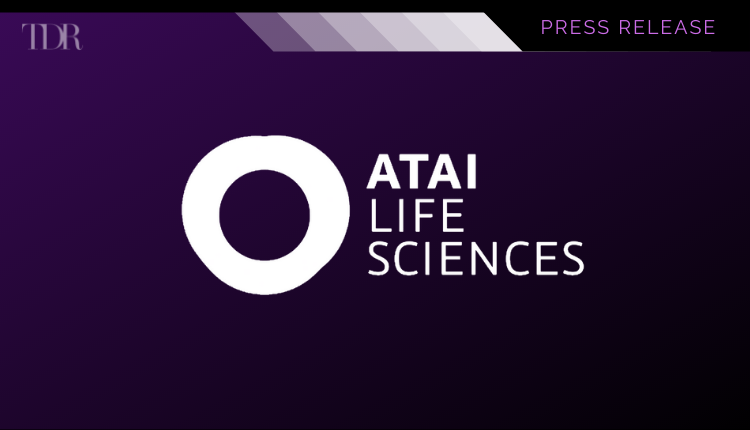
atai Life Sciences Announces Successful Outcome of Phase 2a Biomarker Trial of RL-007 in Cognitive Impairment Associated with Schizophrenia
RL-007 was well tolerated and demonstrated a clinically meaningful pro-cognitive profile
Changes in quantitative electroencephalogram (qEEG) were consistent with the results of a previous Phase 1 trial of RL-007
These results support the progression of RL-007 to a double-blind, placebo-controlled Phase 2 trial focused on cognition
atai Life Sciences N.V. (NASDAQ: ATAI), a clinical-stage biopharmaceutical company aiming to transform the treatment of mental health disorders, today announced positive topline data from its Phase 2a study of RL-007 for Cognitive Impairment Associated with Schizophrenia (CIAS).
The 32-patient, single-arm, single-blind study demonstrated a clinically meaningful pro-cognitive profile for RL-007, based on analysis of general cognition and episodic memory. Additionally, the trial showed changes in quantitative electroencephalogram (qEEG) that are consistent with previous results of a prior study of healthy volunteers. Together, the results support atai’s decision to progress RL-007 to a double-blind, placebo-controlled Phase 2 trial focused on cognition.
The topline Phase 2a data showed dose-related improvements on exploratory cognitive endpoints. These included the Brief Assessment of Cognition in Schizophrenia, Symbol Coding Test (Symbol Coding) and Hopkins Verbal Learning Task (HVLT), focusing on general cognitive function and episodic memory, respectively.1,2 The dose-responsive improvement of Symbol Coding and HVLT replicated the previously observed cognitive bi-phasic dose response of RL-007. Importantly, Symbol Coding is a highly sensitive cognitive endpoint in CIAS patients, has a high correlation with patient outcome, and is a key component of the Measurement and Treatment Research to Improve Cognition in Schizophrenia (MATRICS) Consensus Cognitive Battery (MCCB™).3
In addition to the pro-cognitive effects, a dose dependent response in qEEG was observed, with the greatest increases seen in 20mg and 40mg doses of RL-007. The qEEG data demonstrated salient increases in amplitude in the alpha band (up to 17% increase in normalized, baseline adjusted band power) and in the alpha-slow wave index (up to 21% increase), both markers of alertness believed to correlate with aspects of cognition.4
Notably, these findings recapitulate promising results from a previous study of RL-007 in a human model of cognitive impairment utilizing a scopolamine challenge. This previous trial observed similar qEEG responses and changes in a word recall task within the same dose range. Recognify Life Sciences, an atai Life Sciences platform company, is conducting the current and upcoming RL-007 trials in CIAS.
The impact of cognitive impairment in schizophrenia can be debilitating and limit the ability of patients to conduct everyday tasks. These Phase 2a results further reinforce our belief in RL-007 to provide benefit in this challenging condition.
Florian Brand, CEO and Co-Founder of atai Life Sciences
“These exciting Phase 2a results extend previously observed clinical activities of RL-007 to CIAS patients and support advancement to the next clinical trial, which will be designed to assess cognitive benefits in a double-blind, placebo-controlled manner,” said Matthew Pando, PhD, CEO and Co-Founder of Recognify Life Sciences. “These results demonstrate RL-007’s potential in CIAS, a major area of unmet patient need that presently lacks approved therapies.”
Following these promising findings, atai has committed to initiate a randomized, double-blind, placebo-controlled, proof-of-concept Phase 2 study of RL-007. In addition to symbol coding and HVLT, this trial will also include other cognitive tests taken from the MCCB.
Schizophrenia is a mental health disorder affecting over 21 million people globally and approximately 3.5 million people in the United States.5,6 While some symptoms, like delusions and hallucinations can be managed with antipsychotic medications, over 80% of patients suffer from significant cognitive impairment, which has no approved treatment and can be severely debilitating.7,8 Such cognitive deficits contribute significantly to the disability associated with this condition, impacting the ability of those with schizophrenia to carry out basic tasks necessary for independent living.9
RL-007 Key Opinion Leader Event, January 18, 2022
atai will host an event featuring a presentation by Richard S.E. Keefe, PhD, of Duke University. Dr Keefe will discuss the current treatment landscape and unmet medical need in treating patients with CIAS, and will be followed by Matthew Pando, PhD, CEO and Co-Founder of Recognify Life Sciences, who will discuss the design of this recently completed Phase 2a trial for RL-007 and the preliminary topline data. The event is scheduled for January 18, 2022, at 12 PM ET. You are required to register in advance for the webcast, here. For those who are unable to listen at this time, a replay of the call will be available by clicking here.
About the RL-007 Phase 2a trial
The Phase 2a trial was a single-arm, single blind, multiple-dose study of oral RL-007 administered to subjects with schizophrenia. A total of four, 8-patient cohorts (32 subjects in total) were enrolled, testing the 10mg, 20mg, 40mg, and 80mg doses of RL-007, administered 3 times/day. Patients enrolled had to be on a stable dosing regimen of a protocol-allowed antipsychotic regimen, and they continued their antipsychotic treatment without change throughout the course of this study. All subjects received four doses of placebo followed by six doses of RL-007, although subjects were blinded to the dose strength and sequence of active and placebo capsules.
About RL-007
RL-007 is a neuromodulator that potently enhances synaptic plasticity by modulating excitatory neurotransmission and the cholinergic and gamma-aminobutyric acid type B (GABA type B) receptor systems, all of which are central to learning and memory functions. With its unique mechanism of action, atai believes RL-007 may enhance pro-cognitive functioning, such as neuronal signaling, learning, and memory.
To view the original press release in its entirety click here



